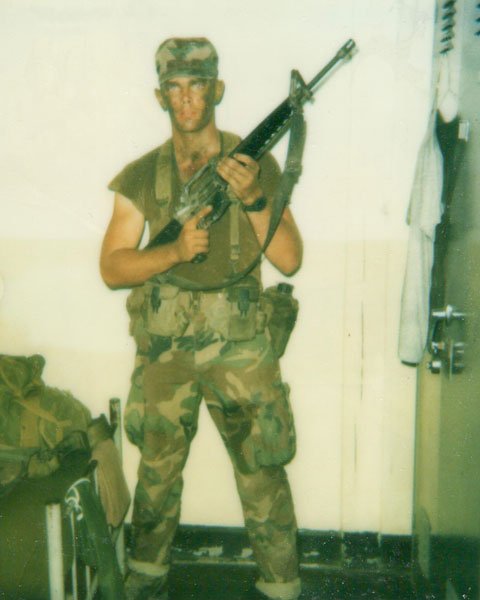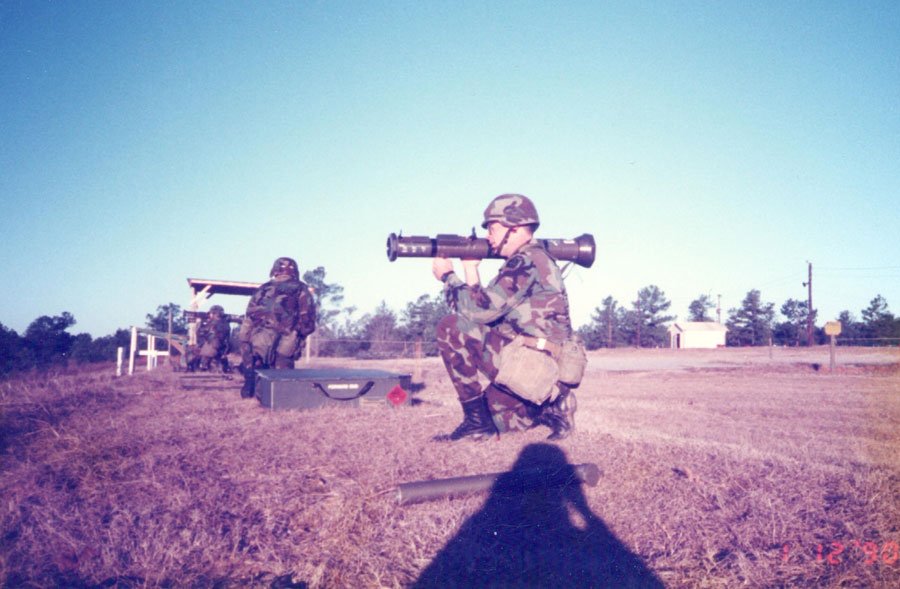Everyone Has Secrets. Mine Are the Wrath and Fury Unleashed By War
There is a reason drill instructors start screaming in your face the moment you arrive at boot camp. Before you can be built up into a proper soldier, you must first be torn down. To be an effective cog in the war-fighting machine, the way you think and feel must also be altered.
At Fort Benning, Georgia, in the summer of 1987, the three drill sergeants who commanded my platoon accosted us like tag-team wrestlers, one of them spitting profanities in a recruit’s face while the others collected their breath so they could yell with full force when their turn came. They belittled anything that didn’t conform to regulations, stripping us of personal pride and sense of self. The message was clear: You don’t matter. Only the unit does.
Our uniforms were just one facet of the uniformity we were taught to embrace; the true changes were taking place beneath our camouflage skin, deep within our impressionable hearts. Drill sergeants praised every outburst of unrestrained rage and punished passivity. When one of us showed weakness, the entire platoon was punished. Pushups, marches in full gear, slithering back and forth on our bellies through the muddy crawl space beneath our barracks. Instead of kindness, respect, and good manners—qualities instilled in me since kindergarten—I found myself goaded towards anger, hatred, and contempt. Powerful emotions that could be focused on an enemy and give our unit a powerful edge in combat. We’d come in as pampered civilians. We were being transformed into uncivilized souls.

Bill Glose preparing for a field exercise. (Photo courtesy of the author)
I remember on the bayonet course, our instructor told us we needed to hate our enemy so we wouldn’t hesitate when it mattered most. Then he demonstrated with a banshee scream as he plunged a bayonet into a sandbag dummy. The fury on his face was mesmerizing. We all mimicked him, stabbing our own dummies, yelling obscenities as we eviscerated our foe.
The same message was repeated throughout camp until it became standard operating procedure. Hate the enemy. Kill without hesitation. When we attacked an objective as a unit, we were taught to shoot, stab, and jab our way to the other side. If anything moves, shoot it until it stops moving. Double tap as you pass by to make sure. Before we’d stepped off the bus into camp, shooting an already wounded foe might have given us pause. No longer. Fury and hate had become part of who we were.
When Iraq invaded Kuwait in 1990, my unit deployed as part of the Gulf War’s first wave of combatants. As we prepared to launch ourselves across the border to take on Saddam Hussein’s Republican Guard, everyone boasted about how many kills they’d rack up, stoking the embers of our fury into an all-consuming fire. Doing so served a functional purpose. Hating the enemy was the only way to preserve our sanity in such an insane situation. Afterward—after war—all that wrath lost its benefit. Every trait in me that military training had sharpened to a vicious edge, I was now asked to sheath. But unleashing fury is much easier than trying to tame it.

Bill Glose fires an Anti-Tank-4 Rocket after receiving the highest marksmanship score of his platoon. (Photo courtesy of the author)
When my service was up, the Army required me to attend transition classes. I’d only served in one combat tour, so I didn’t think warnings of culture shock applied to me. I felt sorry for those poor souls who fought in numerous deployments, constantly flipping the switch on their personality and embracing homicidal rage time and time again. For them, maybe it would be impossible to come back from the wild without bringing the wilderness with them. Not me. I read the required documents, declined counseling, and signed on the dotted line.
I felt a little unmoored at first, giving up the structure that had defined my life for so long and slipping into the unrestrained freedoms of civilian life. I rebelled in tiny ways—grew my hair out, grew a beard—but for the most part, I just tried to fit in. I thought it would be easy. I was wrong.
There were moments when my rage refused to remain bottled up, and I erupted with volcanic anger. One time, I met up at a bar in Georgetown with an old high school friend who now worked in the D.C. area. As I thrashed about on the dance floor, I noticed a trio of Izod-shirted yuppies in a booth pointing my way and laughing. I shot across the floor, stomped across a table that stood between us, then landed in front of the shocked boys, fists balled, gauntlet of my fury thrown at their feet.
Our Journalism Depends on Your Support
The Army had taught me, when ambushed, to turn toward the enemy, fire back, and charge. React without thinking. Get out of the Kill Zone and take the fight to them.
In that Georgetown bar, as I stood there ready to battle, the boys sputtered apologies and raised their hands in surrender. When I saw the stunned looks on their faces, my bloodlust suddenly died, and I found myself equally surprised at how things had escalated so quickly. I shuffled off to a dark corner and felt prickles all over my body, as if everyone else was staring at me. I didn’t dance anymore.
For the most part, I kept myself in check. I locked away my rage and hoped it wouldn’t find the key. The side of me I showed to others was the good-natured, fun-loving guy, someone quick to laugh, even when the joke was on him. Friends came to know me as a compassionate fellow, a shoulder to cry on or to help carry the day’s unwanted baggage. I didn’t talk about my wartime experiences because I didn’t want anyone in the civilized world to know what violence I was capable of and how short was my fuse.
It can be daunting to know this other half exists within you, something you hope no one else ever discovers. But here’s the thing: Everyone wears a different face in different situations; everyone compartmentalizes, not just soldiers. Everyone has their secrets. And most of them are frightened of what others might think if those secrets got out.
Our Journalism Depends on Your Support
Once I finally realized this universal truth, that everyone has secret sides and hidden concerns, I was able to start letting go of my own fears. After I shared my hidden past with those I loved, I no longer had to worry about them discovering it for themselves. I unlocked the box I’d been guarding and let loose the rage, and as its fire slowly petered out, I felt a soothing calm take its place.
I’ve written about the dark side of myself that I tried far too long to keep hidden. After reading those stories, poems, and essays, not one of my friends has changed their attitude toward me. They still accept me as I am, knowing what I once was and might be capable of becoming again. They know this and still joke with me, often at my expense. And I still laugh.
“Good With Hands” by Bill Glose
Originally published in The Comstock Review, Spring/Summer 2013
I wasn’t good with my hands
until I joined the Army.
Never took apart toasters
and lamps, ran wiring
through a wall. Changing oil
or flat tires the only tools
in my belt.
A drill instructor took
the clay of my soft hands
and sculpted iron fists.
I learned to cradle a neck
in the crook of my elbow,
drop so the skull snaps
free from spine. To conceal
the sharp edge of a bayonet
against my forearm before
slashing out. Swinging back
with its point to stab
the sweet spot.
When war ended and we
returned home filled
with useless knowledge,
nothing to do but drink,
I was relieved when
a drunk struck his wife.
Stepping in, hands free
once more to do their job,
to block slow punches,
break a lip, close one eye
behind a swollen cheek.
Gather all my blood
and proclaim
that I am good
for something.
This War Horse reflection was edited by Mike Frankel, fact-checked by Jess Rohan, and copy-edited by Mitchell Hansen-Dewar. Hrisanthi Pickett wrote the headlines.





Comments are closed.